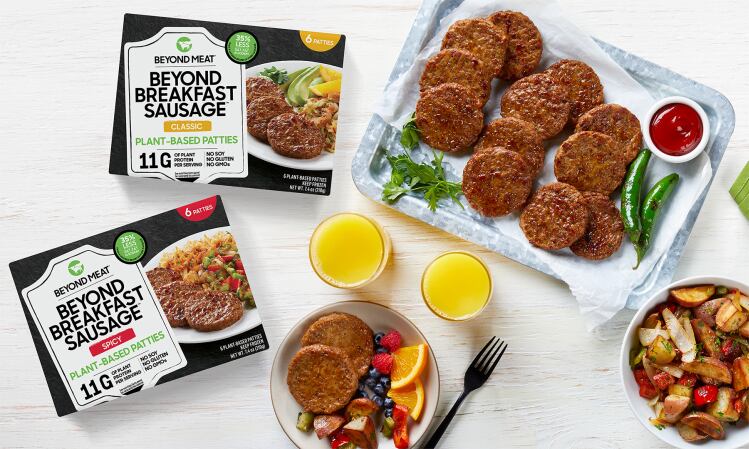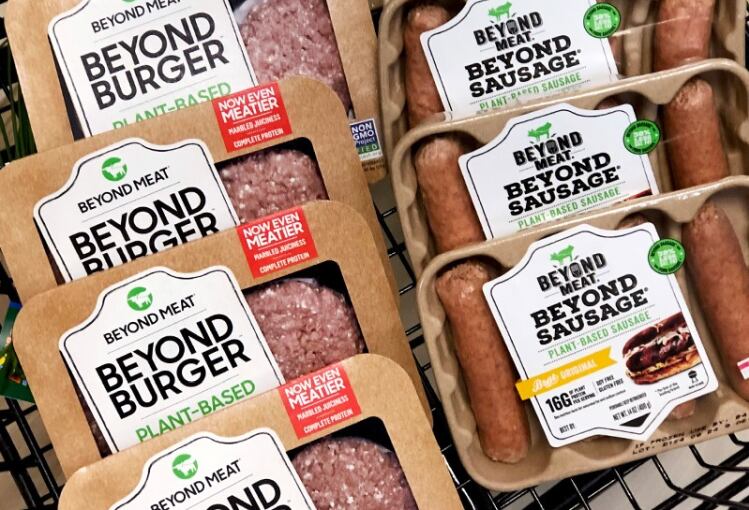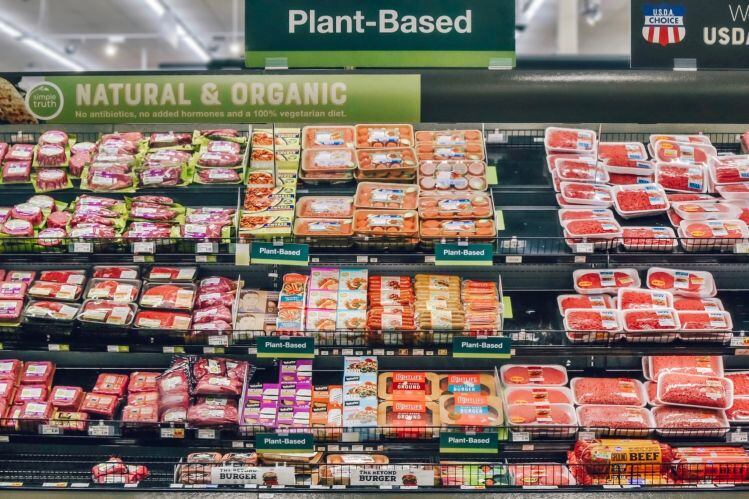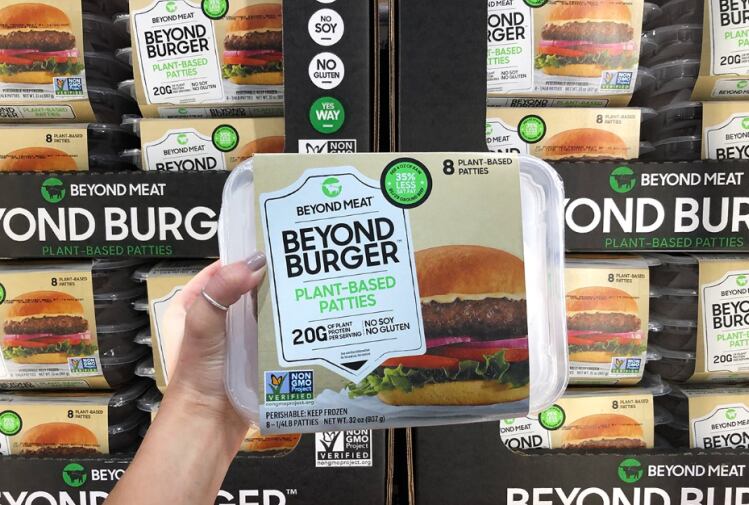While Beyond Meat debuted in the frozen aisle with beef crumbles and chicken strips (the latter have been dropped), the brand took off after launching refrigerated burgers and sausages designed to sit in the [animal] meat case, with sales in its fresh platform growing 275% in 2019 vs 11.8% growth in frozen.
If the refrigerated plant-based meat category is growing significantly faster, however, the “frozen aisle is still the largest section in grocery for plant-based meat… and still represents a sizeable opportunity,” chief growth officer Chuck Muth told FoodNavigator-USA. “Plus, our breakfast sausage patty cooks better from frozen.”
The patties (MSRP $4.99 for six) contain 11g protein per serving, with 50% less total fat, 35% less saturated fat and sodium, 33% fewer calories, and 35% less sodium than the leading brand of pork sausage patties, with a base of pea protein and brown rice protein.
‘We are very much focused on bringing our prices down’
Asked about pricing in the plant-based meat segment following rival Impossible Foods’ move to cut prices to foodservice distributors by 15%, Muth said:
“Impossible is quite a bit smaller than us; they are just starting to scale and as they are scaling, they are finding efficiencies and, I assume, bringing their price down accordingly. However their frontline pricing is still significantly higher than ours, so they still have a bit to go, and our pricing is more attractive.”
He added: “One of our goals is to reduce our pricing, so as we are able to develop more production efficiencies and [increase] capacity, and as we engineer products, we are very much focused on bringing our prices down.
“We’ve made it our stated goal that at least one of our items will be as cheap or cheaper than animal meat within the next four years or so, and that’s the long term goal, to be priced competitively, not just with other plant based meats but with animal meats as well.”
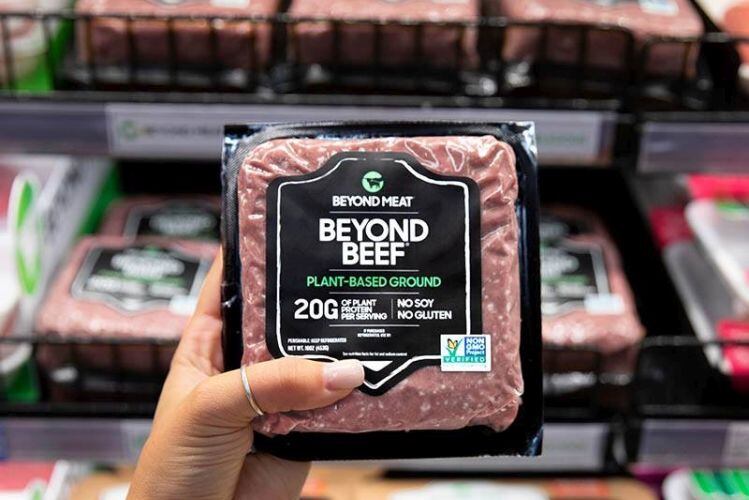
Higher average checks, new guests, incremental growth
So is Beyond Meat sustaining or growing sales velocities in high-profile restaurant chains after the initial excitement or marketing budget wears off?
“I think the encouraging thing for us is seeing product expansions in existing chains where we have partnerships, because they’re seeing good results coming in,” said Muth, citing the example of Carl’s Jr and Hardee’s now offering Beyond Sausage breakfast burritos and egg and cheese biscuits as well as burgers.
He also noted that Dunkin’ – which is rolling out Beyond Sausage sandwiches nationwide after a successful trial – had attracted new guests and increased check sizes in part because plant-based products are premium items, but also because customers have proved more likely to pair them with higher-priced beverages such as lattes and cold brew. “It’s bringing in bigger register rings.”
While some big names in QSR have not yet introduced plant-based entrees or breakfast options, they are all monitoring the space closely, he said.
“It’s more a timing issue than anything, plus they also want something that’s unique to them since they are not going to be first to market, so they are thinking about what will differentiate them from the competition. But long term if they see their competitors being successful in this space they are going to have to take a very serious look.”
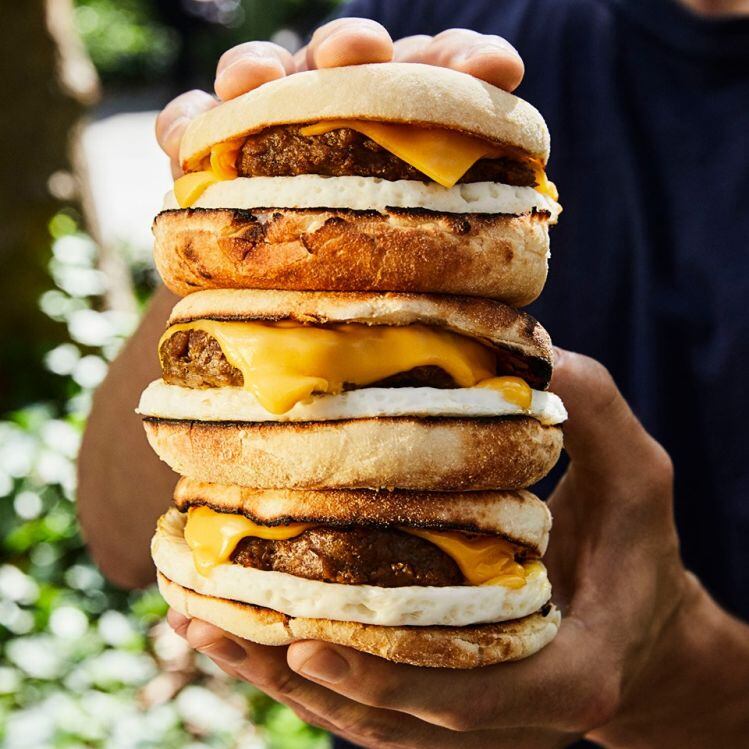
Manufacturing and ingredients
Asked if Beyond Meat were in a position to be able to say ‘yes’ to every account that’s interested, or whether supply constraints were holding the company back, Muth said the firm was expanding in-house extrusion capabilities “in the near future” and adding more co-packers to its network in the US, Canada, Europe and Asia for downstream patty/sausage formation and packaging.
His comments came as CEO Ethan Brown told analysts last month that Beyond Meat began the year with around $700m in gross revenue capacity, with plans to scale to over a billion by the end of the year.
On the ingredient sourcing front, while Beyond Meat has recently expanded its pea protein sourcing capabilities, it is also exploring multiple other plant-based protein sources for sensory reasons (adding new flavors), nutritional reasons (to balance out amino acid profiles), and supply chain reasons (to diversify), said Muth, who noted that the Beyond Sausage uses a small amount of faba bean protein, while Beyond Beef and Beyond Burgers utilize mung bean and rice protein as well as peas.
As for the innovation pipeline, right now, Beyond Meat is focused on beef, poultry, and pork alternatives including plant-based bacon, said Muth. “But down the road we’d potentially look at other things.”
‘There are lots of false narratives out there…’
Quizzed about the brand’s decision to go on the offensive this year to tackle the narrative that plant-based meats are ‘highly processed’ and unhealthy, he said:
“We believe in the category and the space and we’re very positive, you won’t hear us bad mouth other plant-based products or brands, but there are a lot of false narratives out there about what’s in our products, so we think we have an obligation to talk about what’s in our foods, so to understand that things like methyl cellulose [which is used in most plant-based meat products] are in many foods, things like ice cream and baked goods.
“We want to make sure that consumers are well informed and to remind people that most foods we eat are processed.”
Asked whether it was disingenuous to make a virtue of Beyond Meat’s ‘all-natural’ non-GMO credentials [which distinguish it from rival Impossible Foods] given its commitment to science-based messaging and consumer education, he said:
“It’s not about what we believe, it’s what our consumers, our shoppers, believe, so we’re not saying there’s anything bad about it [genetic engineering in food production].”

